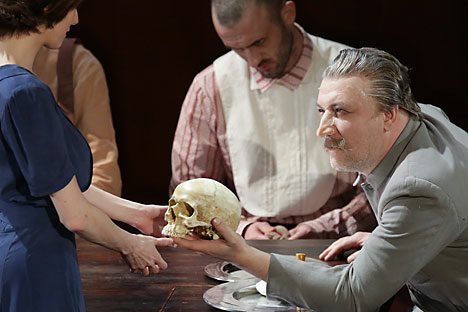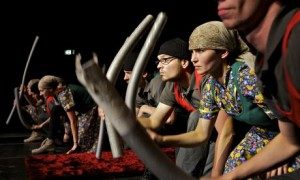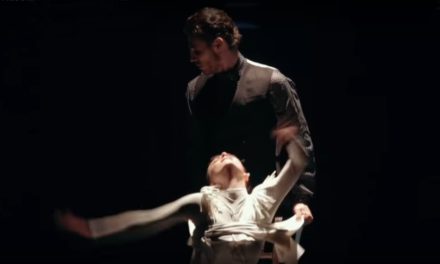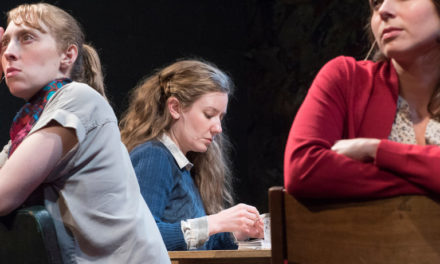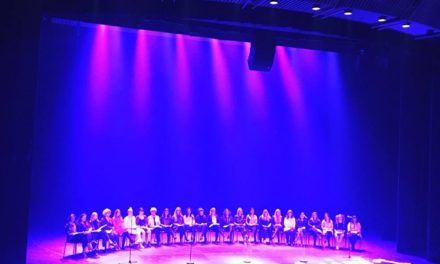As the government continues to censor and cancel Russian theater performances, a group of artists have come together to formally unionize the independent theater sector.
In the beleagured Sakharov Center a modestly attended press conference predicts the escalation of tensions between culture managers and theater makers. Leaders of the Moscow theater scene announced the formation of a union of independent theaters and invited independent theaters to join. Its provisional title is MAST, Moscow Association for Self-Supporting Theaters. Its first congress is scheduled for May 18.
But what does this event mean for the world of Russian theater, where more than 95% of theaters are still financed by contracts with state and local government?
Historically, some flexibility for projects beyond the repertoire of state theaters has been encouraged by a system of arts grants, considered more flexible and independent though also disbursed by the government. But Filipp Los, former head of the Moscow-based Open Stage (Otkrytaia stsena) laboratory, which produces independent projects by young theater collectives, described how the grant system falls dramatically short of ensuring the completion of projects. In fact, the stifling of grant-based Open Stage projects moved its former director to call for a union of independent theaters.
Founded in 2005, Open Stage was combined with the Center for Dramaturgy and Directing (TsDR) in 2014. But rather than securing spaces for the work of experimental studios and newly-formed collectives at the coveted Povarskaia 20 building in Moscow, and rather than freeing them from administrative responsibilities to focus on artmaking, the merger meant the de-facto control of Dmitry Palaguta, director of the TsDR, a man with a background in law and economics, not theater.
Theater makers, affected by the merger, recounted multiple issues with the “optimization” policies that led to it in the first place. Under Palaguta’s direction, every month has seen the cancellation of five or more premieres of groups associated with Open Stage, Los said. In an open letter posted to social networks, Los explained that he believes the Open Stage initiative is being systematically liquidated. Although they have won grants from the government, theater projects are consistently prevented from seeing premieres, are denied access to their own costumes and properties, and, finally, they are being unceremoniously and, quite suddenly, told to move out. As of now, said Los, all of the premieres scheduled for the month of May have been cancelled.
In fact, artistic director Dmitry Palaguta ordered the cancellation of an Open Stage premiere just two hours before showtime on the night before the conference took place. According to a formal decree issued by the director of the TsDR, the cancellation was “in connection to the impossibility of guaranteeing spectators’ safety during the show due to the presence of unauthorized persons on the theater’s premises.” One of these unauthorized persons turned out to be Konstantin Gross, choreographer and director of Art-Rezidentsia, which operated out of an Open Stage studio for more than three years. At the conference, Gross recounted that staff members of TsDR approached him and his group demanding that they vacate the premises immediately, at which point they called the police. But on director Palaguta’s order, Art-Rezidentsia is now forbidden from entering their rented space. “They bring people here everyday, praise the space,” Gross said, indicating that TsDR is displacing arts groups like his in favor of high-end business renters.
If successful, the union of independent theaters would negotiate with the government on such matters as the administration of artistic grants and spaces. For his part, Filipp Los described how performance spaces and performance dates at TsDR are given on a rental basis to state-funded theaters over the independent projects of Open Stage, despite the fervent pace of activity, ticket sales, and audience loyalty to these young groups. Actress Iulia Skirina spoke movingly about the shuttering of one grant-winning project due to the law on obscene language and then of another — this time by Palaguta’s administration – without explanation. The administration at TsDR does not watch productions, it merely cancels them, she explained. A petition for the removal of TsDR’s artistic director is now being circulated.
Also present at the press conference was well-known theater director Iosif Raikhelgauz, who observed that the current Ministry of Culture seems to be reneging on the practices and policies enacted under the former minister, Sergei Kapkov. The noble cause of Open Stage, to support the work of young theater makers – playwrights, directors, choreographers, actors, dancers, scenographers – is at risk, Raikhelgauz emphasized. Iurii Alesin, artistic director of the puppet theater “Teatr Snark,” pointed out the existence of a 2011 government directive that prioritizes the development of a wide range of theater projects. The union, he argued, would help officials return to this policy, and away from the practice of “optimizing” theater initiatives into oblivion.
Theater scholar Elena Koval’skaia reminded the press conference that the Open Stage initiative jumpstarted successful theater makers such as Ivan Vyrypaev and Konstantin Bogomolov. Along with Teatr.Doc, it is one of the few platforms for independent theatrical experimentation in Moscow. Koval’skaia objected to the proposed name of the union, arguing that instead of calling its members “Self-Supporting” it should refer to them as “Independent” – taking a stronger political stance, she said.
Koval’skaia’s comments might be applied to the fifteen theater journals, financed by the Ministry of Culture, which now find themselves under the Ministry’s review. Not surprisingly, perhaps, the left-leaning journal “Theater” (Teatr) in particular feels threatened by the government review process, which promises to identify “ineffective” journals and to reduce budgetary spending on theater journalism.
Meanwhile, another stronghold of theatrical experiment in Moscow is facing critique from the government. On April 14th State Duma deputy Sergei Vostretsov, a member of Vladimir Putin’s party, United Russia, and the chair of the association of labor unions, picketed outside of Gogol-Center. The Gogol had been transformed almost overnight into a hub of theatrical innovation when in 2012 former Minister of Culture Sergei Kapkov named Kirill Serebrennikov as its artistic director. Gogol-Center now boasts a young, progressive audience and consistently delivers award-winning premieres. But, along with his fellow picketers, labor union activists, Vostretsov claims that the theater has spent its government-contract money on lavish parties. Other deputies from conservative sections of Putin’s party United Russia have also called for a thorough investigation of the theater’s use of funds.
Following quick on the heels of the Novosibirsk Opera scandal, this week saw the Minister of Culture, Vladimir Medinsky called to resolve another controversy in the theater world. At the Academic Theater of Drama in Pskov several actors published a complaint to the Minister, calling for the cancellation of Varvara Faer’s production of The Bathhouse Attendant (Banshchik). The letter declared that the actors “do not want to be hostages of the director’s ambitions and political preferences” and described the obcene language and nudity in the play. What started as a documentary project about Pskov’s inhabitants gradually became the director’s own political manifesto, said the actors. Particularly objectionable was the “coronation ritual,” a scene in which the actors kiss the behind of a dwarf who declares himself king. “The actors who did not sign said that yesterday’s meeting [April 14th], which took place behind my back, was a literalization of this ritual between the troupe and Meskhiev [the artistic director of the theater],” the play’s director Varvara Faer noted wryly. “If one doesn’t like the country, or life in it, it’s always possible to leave or to start your own project, your own theater,” said one actress in her statement to Medinsky just a day later. An actor added, “When we did the first read-through, I put myself in the place of the spectator and I was frightened. I felt sorry for the spectator. The theater must first and foremost bring light, goodness.” Sitting next to the Minister of Culture and the governor of the Pskov District on the theater’s stage, artistic director Dmitry Meskhiev expressed support for his actors.
Medinsky, who had earlier assuaged theater makers that there will be no “artistic councils” supervising the choice of plays, reversed his position, suggesting that such a council may indeed be necessary. But journalists and theaters have called the artistic council a return to Soviet censorship and the Pskov letter a Soviet-style denunciation. For her part, the director of the controversial Bathhouse Attendant suspects that the four actors who signed the letter were pressured by the theater’s administration, and that the production’s staff sabotaged the preparation the costumes, properties, and set. In lieu of a statement to Medinsky, Faer rehearsed with the remaining actors (video).
A longtime actress and director at Moscow’s Teatr.doc, where Russian documentary theater originated in 2002, Faer has courted political controversy before. In 2012, in the wake of Putin’s controversial third-time election, Faer adapted Dario Fo’s 2003 play L’Anomalo bicephalo about a surgery that leaves Berlusconi with Putin’s brain. For Teatr.Doc’s audiences, the play Berlusputin presented Putin with Berlusconi’s brain was a satire “to show our political position after 20 years of silence and passivity. People who come here are generally fed up with the way the government has been humiliating them”, Faer has said of the Teatr.Doc production.
But in contrast to the readily-available political position of director Varvara Faer, actors on both sides of the divide in the Pskov Academic Theater insist that they do not wish to engage in politics, and simply want to continue making art. As if echoing the Pskov actors an actress in the Moscow press conference at the Union of Self-Supporting Theaters remarked, “It would be nice to engage in artmaking, not in politics, of which I, personally, have no understanding.” But the situation in the Russian theater seems to indicate that, willing or not, actors all over Russia are finding themselves in the center of a culture war. And the demands of this culture war are at odds with Russian actors’ traditional education, with its emphasis on directorial will and the separation of art and politics.
This post was written by the author in their personal capacity.The opinions expressed in this article are the author’s own and do not reflect the view of The Theatre Times, their staff or collaborators.
This post was written by Ania Aizman.
The views expressed here belong to the author and do not necessarily reflect our views and opinions.

